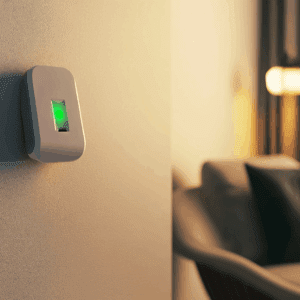Wandering is one of the most serious safety concerns for families supporting someone with dementia. It’s estimated that 6 in 10 people with dementia will wander at some point - and if they’re not found within 24 hours, the risk of harm increases significantly.
That’s where GPS tracking technology can help.
Whether it’s built into a mobile phone app, worn as a bracelet, or integrated into a smartwatch, GPS trackers offer peace of mind by showing where a person is - and in some cases, alerting caregivers if they’ve gone somewhere unexpected.
In this article, we’ll explore how GPS tracking supports independence and safety, how Elli Cares uses it in a non-intrusive way, and how to choose the right option for your loved one.
Why GPS Tracking Is Helpful in Dementia Care
As dementia progresses, it can affect spatial awareness, memory, and judgment. A person may go for a walk and forget how to return home, or they may try to visit a familiar place only to become disoriented.
GPS tracking helps by:
- Showing a person’s real-time location
- Sending alerts when they leave a designated “safe zone”
- Allowing caregivers to act quickly in case of confusion or distress
- Supporting safe independence while reducing the need for constant supervision
This doesn’t just protect the person living with dementia - it gives family members the freedom to relax, knowing they’ll be notified if something seems off.
How Elli Cares Supports Location Safety
The Elli Cares app offers a unique, app-based approach to GPS tracking—designed specifically for people with dementia and their care teams.
How it works:
- Family members or care partners set Safe Zones - such as home, a familiar café, or a walking route
- If the person moves outside a safe zone, Elli Cares sends a real-time notification to their care team
- The app also includes a “Find My Way Home” button, so the person with dementia can quickly navigate back if they get lost
👉 Explore Elli Cares Safe Zones & GPS tracking
Unlike wearables, Elli Cares uses the smartphone your loved one already has - removing the need for extra devices, subscriptions, or tech confusion. It’s discreet, easy to set up, and works globally.
Take a look at the video below to see how Safe Zones and GPS tracking works with Elli Cares:
Other GPS Trackers for Dementia
Here are a few other GPS tracking options available on the market today, each with different strengths:
AngelSense GPS Tracker
- Wearable device with two-way audio
- Designed specifically for vulnerable individuals, including those with autism or dementia
- Includes features like step count, late departure alerts, and voice monitoring 👉 Visit AngelSense
GPS SmartSole
- GPS tracking embedded in a shoe insole
- Automatically updates location to a caregiver’s app
- Waterproof and difficult for the wearer to remove 👉 Visit GPS SmartSole
Jiobit Smart Tag
- Small, lightweight clip-on tracker for clothing or belt loops
- Works with mobile app for real-time location, safe zones, and history
- Geared toward children and seniors alike
👉 Visit Jiobit
Apple Watch with Family Setup
- For tech-savvy seniors, the Apple Watch can offer location tracking
- Works well when paired with Family Sharing and cellular service
- Includes fall detection and health metrics too 👉 Apple Watch Family Setup Info
What to Consider When Choosing a GPS Tracker
Not all GPS trackers are created equal. When choosing the right one, consider the following:
- Ease of Use
Can your loved one use it without confusion or discomfort? App-based options like Elli Cares work in the background with minimal input. - Battery Life
Frequent charging can be tricky for someone with memory issues. Elli Cares runs on the phone’s location services and alerts you if battery levels drop. - Comfort and Visibility
Wearables may be uncomfortable or removed. Embedded or passive systems (like phone-based tracking) can be more discreet. - Alert Settings
Does it notify caregivers immediately when a person wanders or is inactive? Can you set safe zones? Elli Cares includes both. - Cost and Subscriptions
Some trackers require ongoing fees. Elli Cares is available through a subscription model that includes other dementia-specific features, not just GPS. - Privacy and Consent
Respect is essential. Choose a system that promotes dignity and autonomy, with transparency around how and when tracking is used.
GPS Tracking Should Empower, Not Control
The best GPS solutions for dementia support safety without removing independence. For someone in early to mid-stage dementia, knowing that their loved ones can check in quietly from a distance brings relief - not restriction.
Used with empathy and good communication, GPS tools like Elli Cares can help people continue doing the things they love, like going for walks or visiting friends, while reducing risk and easing worry for family members.








